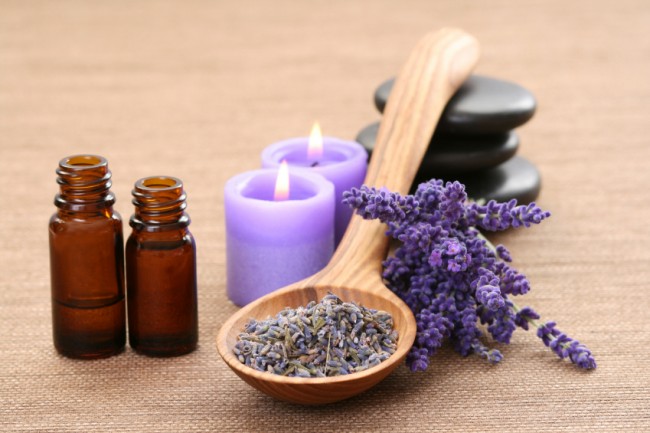Many pregnant women often use different essential oils for massages during pregnancy. They feel calmer and less stressed post its use. However, it is good know that the exact effect essential oils on the developing baby is not completely known. In fact, since the molecules of the essential oils are very small there is a possibility that they may cross the placenta and reach the baby’s developing circulatory system. So do be very cautious about using essential oils during pregnancy, especially during the first trimester. In fact, for women who are prone to miscarriages, even oils that are generally safe during the first trimester can be too stimulating.
Essential Oils during Pregnancy
The oils that are safe to use during pregnancy are:
- Frankincense – for the prevention of stretch marks, anxiety and stress
- Lavender – for the prevention of headaches and anxiety. It is safe to use it only after the completion of the 12th week of pregnancy.
- Lemon – for the prevention of nausea and morning sickness
- Sandalwood – for the prevention of insomnia, swollen ankles, aches and pains and stress
- Wild Orange – for the prevention of nausea, morning sickness and constipation
- Geranium – for the prevention of insomnia, stretch marks, varicose veins, haemorrhoids and swollen ankles
- Grapefruit – for the prevention of swollen ankles, muscle fatigue and for fluid retention. It also refreshes and energizes.
- Ylang ylang – it reduces blood pressure and reduces stress
The oils that should be diluted with another oil, called the carrier oil, like coconut oil are:
- Clove
- Cypress
- Eucalyptus
- Ginger
- Myrrh
- Oregano
- Peppermint (However use this one sparingly as you enter the end of your pregnancy and also during breastfeeding, because some studies have shown that it reduces milk production.)
As for the oils listed below, it is best to consult your doctor before you use them.
- Basil – it is said to contribute to abnormal cell development
- Rosemary – it tends to increase blood pressure and could lease to premature contractions
- Clary Sage – it may trigger contractions and even cause uterine bleeding
- Thyme – it may trigger contractions
- Cinnamon – it may trigger contractions
- Wintergreen
- White Fir
- Camphor
- Lemongrass
- Parsley seed
In some cases, it is best to stay away from using essential oils altogether. Don’t use any oils if you have:
- Had a miscarriage before
- Had any vaginal bleeding during your current pregnancy
- Epilepsy
- Heart issues
- Diabetes
- Diseases relating to the liver or the kidney
- Thyroid
Blending the Essential Oil
- Since you are more prone to being sensitive to various smells, dilute the oil well. Instead of the usual 10-12 drops per 25ml, use only 5-7 drops for every 25 ml during pregnancy.
- Blend the oil in vegetable oil, jojoba or aqueous cream.
- Don’t blend the oil in baby oil as that prevents the absorption of the oil into your skin.
Treating Different Pregnancy Symptoms
Morning Sickness
To reduce morning sickness you can use the essential oils in any of these ways:
- Vaporize it in the room overnight
- Put a drop or two on your pillow edge
- Take a 5ml bottle and place a few cotton balls in it. Add a few drops of the oil and keep the bottle closed. Take a whiff of the oil whenever you are feeling nauseous.
- Use Grapefruit or Lavender for morning sickness
Swollen Ankles
Essential oils that stimulate lymphatic drainage are useful to treat swollen ankles. However it is best to use these only in the 2nd and the 3rd trimesters.
- Add a few drops of Geranium, Lemon and Lavender in a large bucket of water and soak your feet in it for about 10-15 minutes.
- Add a couple of drops each of Grapefruit, Lemon, Tangerine, and Orange into a little carrier oil or cream and massage it onto your foot.
- For most other aches and pains on the back and thighs a light massage using chamomile oil feels wonderful.
Stretch Marks
To prevent stretch marks you could massage over your abdomen and breasts the below oil combination. However it is best to use them only after your first trimester.
- Diluted lavender and tangerine oil or diluted primrose oil.
- Combine couple of drops each of Helichrysum, Lavender and Frankincense with 4 Vitamin E capsules in an ounce of coconut oil and store it in a jar.
Precautions
Skin Irritation
Some oils can increase the skin irritation during pregnancy. Pregnancy is a time when the skin tends to become dry and itchy. While a slow massage helps, some essential oils can have an adverse effect and increase the amount of itchiness. Some of these oils are:
- Black Pepper
- Cinnamon
- Clove
- Lemongrass
- Tea tree
- Ylang Ylang
Before using these oils during pregnancy it best to first do a patch test. For this dilute the oil and then apply it on the inside of your arm. Wait for a day to see if your under arm feels itchy or not. If it does then it means that your skin is sensitive to that essential oil. To remove the itchiness from your underarm, rub some vegetable oil over the area and don’t that oil again.
Other Precautions
- When you choose an essential oil to use during your pregnancy, do make sure that you choose one that is a pure one. This is needed because often some harmful substances present in the oils can prove to cause adverse reactions during pregnancy. Chances are that if you are buying a large bottle of essential oil at a low price then it is not of a pure variety.
- Research and know which ones should be avoided during pregnancy. This is because these oils can be very potent and wrong usage can even stimulate uterine contractions.
- The first trimester is a very important time during your pregnancy. So everything that you eat or put on your body should be done with utmost care. For example even if you are using, say, oils like lavender or peppermint for your headache, dilute it in some coconut oil (called the carrier oil) before applying.
- Avoid using old, oxidised citrus, pine, fir and spruce oils
- If the essential oil gets into your eyes then wash with vegetable oil – water does not work.
- Avoid all essential oils during the first three months if miscarriage is or has been a concern.
- Try not to use one oil for an extended period of time.
Disclaimer: The information provided here is not intended to diagnose or treat any medical condition. If you have any concerns do consult your doctor.






